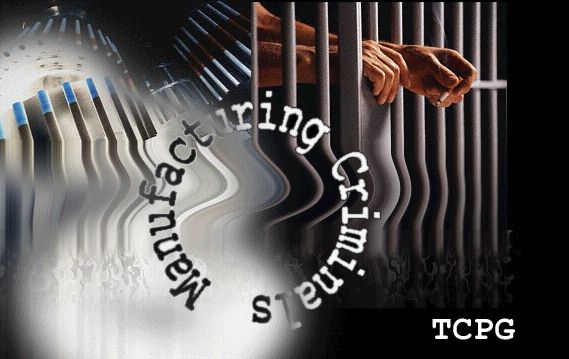|
Overview
The proposal at issue is building five more prisons in Michigan, to increase them from 52 to 57. Three state prisons total used to be enough in Michigan, pre-tobacco. We need to stop building more prisons, and do genuine crime prevention, dealing with tobacco. Here is why:
Minorities are targeted into the drug sequence. Tobacco is typically the gateway (starter) drug, age 11-12. It is treated as a "white" drug; racists deem arresting its pushers a burden on the judicial system.
However, subsequent drugs in the drug sequence (cocaine, etc.) are deemed "black" drugs, so massive disproportionate penalties are imposed. Racists feel that jailing blacks en masse and vast prison-building programs do not burden the judicial system. TCPG disagrees, and urges
(1) enforcing criminalizing the "white" drug tobacco, and
(2) restoring the law to the 1909 era, halting the "War on Blacks" . . . "Drugs."
Background
In the post-Civil War era, ex-Confederates resisted blacks' right to vote. The Constitution allowed disenfranchisement of criminals--a loophole the ex-Confederates ruthlessly exploited. Result: ex-Confederates manipulated voter qualifications: allowing voting despite crimes they felt whites commit (e.g., murder), while disenfranchising for crimes they felt blacks commit (e.g., burglary). Source: Andrew L. Shapiro, "Challenging Criminal Disenfranchisement Under the Voting Rights Act: A New Strategy,"103 Yale Law J 537-566 (Nov 1993).
Ex-Confederates did not passively await black crime, but set out to cause it: Medical facts on the crime causation process were known since the Auburn Report (1854) linked tobacco and crime. Tobacco is a narcotic, mind-altering, inhibition-reducing drug that leads to alcoholism, other drug abuse, and crime. Ex-Confederates perverted that medical knowledge by using it to cause "black" crime, thus convictions and loss of the right to vote.
This continues:
(1) cigarette advertising and sales targeting blacks,
(2) manipulating legislators to ban post-gateway drug activities, while
(3) sabotaging action against the gateway drug that leads to post-gateway drug use, and
(4) manipulating research to "justify" the above.
Ex-Confederates (racists) see the goal: cause "black" crime, then disenfranchise them. Their victims barely realize what is happening to them, and are near-defenseless.
I. From Physical Slavery to Chemical Slavery
Tobacco was part of the slavery process. Masters forced slaves to
(1) "clear the dense forests that covered Virginia and part of Maryland,"
(2) "cultivate" and "harvest" it; and
(3) create "tobacco aristocracy." Source: William Emboden, Jr., Narcotic Plants (NY: Macmillan Co, 1972), p 107.
Tobacco as chemical slavery was next. (Some escape, but escape is no argument for it, but corroboration it is slavery.) "Smoking prevalence among active alcoholics approaches 90%." Source: J. T. Hayes, et al. "Alcoholism and Nicotine Dependence Treatment," 15 Journal of Addictive Diseases 135 (1996).
Smoking was recognized as an addiction, slavery, soon after Columbus' arrival, and was so identified. Source: Dept of Health, Educ & Welfare, Research on Smoking Behavior: Research Monograph 17, Publication ADM 78-581 (Dec 1977). By the 1880's, tobacco companies admitted smoking is addictive, nicotine is a drug--admissions in the context of lawsuits to enforce "blue laws" banning Sunday sales of all but necessities and drugs. In published cases, several courts agreed tobacco is a narcotic drug, e.g., State v Ohmer , 34 Mo App 115 (1889).
II. Tobacco, 90%, Crime
"Nationwide, the [ratio] of smokers [to non-smokers] in prisons is 90 percent." Sources: McKinney v Anderson, 924 F2d 1500, 1507 n 21 (CA 9, 1991), affirmed and remanded, 509 US 25 (1993), and analysts Jackson, 1854; Hodgkin, 1857; Ellis, 1901; Lindsay, 1914; Torrance, 1916; Brum, 1924; Danis, 1925; Healy and Bonner, 1926; Crane, Dawson, Pollock, and Shaw, 1931; Wood, 1944, etc.
This fact (the 90% factor among criminals is tobacco) needs emphasis. Why? to rebut racist ranting (e.g., 56% blacks in Michigan prisons) using statistics in brazen disregard of the targeting process via the gateway drug.
III. Poverty
Slave-created wealth did not accrue to slaves. Biblical precedent on freeing slaves is paying reparations. Source: Exodus 12:35-36.
With Secretary of War Edwin N. Stanton, Gen. William. T. Sherman issued Special Field Order #15 (11 Jan 1865) (Text) to begin the process of NTE 40 acres of land distribution to freed slaves. This Order was to be implemented by Gen. Rufus Saxton.
But (1866) Pres. Andrew Johnson revoked it.
Black poverty (due to no reparations) was a factor in the mass destruction of their right to vote that followed (and the "lynching epidemic").
The subterfuge of using the crime exception to the 15th Amendment evaded otherwise foreseeable Northern objections. Source: Prof. Michael Fellman, Citizen Sherman (NY: Random House, 1995) pp 165-170, 185, 409. This vestigial remnant of slavery has continuing adverse effect, contrary to the 13th Amendment.
IV. The Supreme Court Allows Abuses
The Supreme Court allows abuses, e.g.,
(a) "More than 90% of the persons sentenced in 1994 for crack cocaine trafficking were black" and
(b) use of police perjury to convict people. Sources: United States v Armstrong, 517 US 456; 116 S Ct 1480; 134 L Ed 2d 687, 701 (1996); and Briscoe v LaHue, 460 US 325; 103 S Ct 1108; 75 L Ed 2d 96 (1983), respectively.
The Supreme Court thus enhances racism. Congress has not overridden either decision.
V. Government Lying
The Commissioner of Narcotics and a U.S. Attorney published alleged ill effects of drug use, but falsified, i.e., listed tobacco effects. Source: Harry J. Anslinger and William F. Tompkins, The Traffic in Narcotics (NY: Funk & Wagnalls, 1953), p 336.
A subsequent Am Bar - Medical Assn. Report opposed criminalizing use of post-gateway drugs, refuted their purported ill effects, and cited real causes (e.g., poverty). The gov't limited printing of, and denounced the ABA-AMA Report, so later the Indiana University Press reprinted it. Source: ABA-AMA, Drug Addiction: Crime or Disease (Indiana Univ Press, 1961), p 49.
The War on Post-Gateway Drugs was not medically but politically initiated. The lesson of Prohibition (don't ban a post-gateway drug) was ignored. (Prohibition was due to World War I anti-German feelings, not medical basis.)
The motive for doing a War on Post-Gateway Drugs but not on tobacco is racist, deducible from the racist result, black crime and disenfranchisement.
VI. Tobacco Mind-Altering Role
The mind-altering role of tobacco was known in the 19th century, e.g., every 19th century Presidential assassin was a smoker. Medical references to tobacco in mental disorder terms are still many. They include the HEW Monograph 17, supra; Am Psychiatric Assn., Diagnostic and Statistical Manual of Mental Disorders (all editions, 1980 to present); and the Dept of Health and Human Services' book International Classification of Disease, 9th ed (all reprints 1980 to present). Such professional data is brazenly disregarded by racist legislators and researchers. This disregard aids and abets the continuing Confederate assault on blacks.
VII. Misplaced Law Enforcment Priorities
Racist legislators and cops knowingly, brazenly omit pre-gateway drug enforcement. They focus on post-gateway drugs. Racist motive is deducible from the result, black crime and disenfranchisement. Examples of unenforced rules:
(1) MCL § 750.27, MSA § 28.216 (no manufacture, sale, giveaway of cigarettes);
(2) common law against providing the means of death; and
(3) 29 CFR § 1910.1000 (ban on emissions from tobacco, i.e. on use).
Recommendations
(1) Pursuant to the lesson of Prohibition, and in recognition of the 90% role of tobacco in crime, revise all laws against post-gateway drugs to restore the 1909-era focus--targeting the gateway drug;
(2) enforce
(i) MCL § 750.27, MSA § 28.216 (no manufacture, sale, giveaway of cigarettes);
(ii) common law against providing the means of death; and
(iii) 29 CFR § 1910.1000 (ban on emissions from tobacco, i.e. on its use);
(3) reinstate Special Field Order 15, confiscating slavers' property;
(4) recognize that the failure to confiscate slavers' property enabled tobacco effects, including targeting blacks via its foreseeable known results, so
(i) transfer all tobacco-related property pursuant to SFO 15 and RICO to slavery/tobacco victims/heirs;
(ii) ban interstate transportation of tobacco, and, nationwide, its growth, manufacture, sale, and giveaway; and
(iii) ban tobacco advertising;
(5) investigate the misdirection of the War on Drugs and police priorities off the pre-gateway drug; expel Confederates-in-belief (racists) from government and judiciary; appoint people with proper priorities; and
(6) override Supreme Court decisions allowing discrimination in prosecution and use of pro-conviction perjury, and
(7) abolish disenfranchisement for crime.

Recommended Websites for Background Data
Rep. Maxine Waters' Bill (H.R. 1681)
To Change Enforcement Priorities
We care, and this site is sponsored as a public service by
The Crime Prevention Group. Please read our tobacco effects page.
Email@TCPG Copyright © 1998 Leroy J. Pletten
|
 TCPG Testimony At the 2/26/98 Public Hearing
TCPG Testimony At the 2/26/98 Public Hearing 
